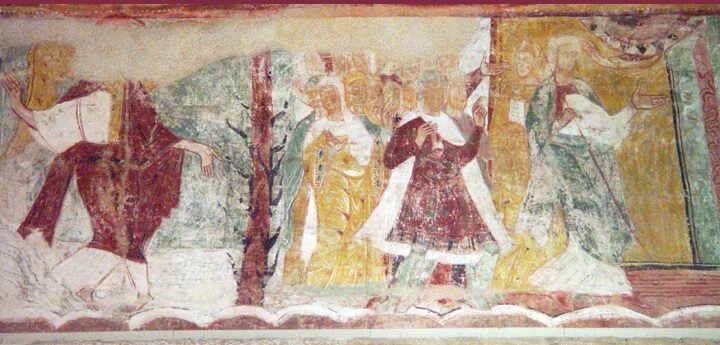Commentary on Genesis 1:1—2:4a
You know this passage. Even if you weren’t a minister, or even a Christian, you would have heard the mighty King James invocation, “In the beginning …” In an age of ecocatastrophe, you have hopefully preached this passage up and down. There is no lack of commentary on it. But tonight, for the Easter Vigil, with your permission, I’d like to point to some of the features that our ancient Christian forebears pointed out.
I defy you to get out of the first five verses of our scripture without seeing glimpses of God the Holy Trinity. It’s not just that “God” (1:1) is always Trinity in our faith. It’s that a “wind from God” hovers over the waters: a resonance of the Holy Spirit. Light brings to mind Christ, the light of the world (John 8:12). Not that the eternal Son is created—no. He is the One in whom all things are made (John 1; Colossians 1:15–20).
Careful now—you can’t make these claims in a way that denigrates our Jewish forebears. Our elder siblings in faith have their own faith-filled, creative ways to fill in the gaps between Scripture’s words. This is specifically Christian “midrash,” or commentary. It’s designed to delight, to decorate, to accentuate. That’s no small thing. It’s precisely what our preaching is for, too.
God separates the waters from the waters (1:6–8). We cannot help but hear echoes of our baptism. The world is nothing but water. But it’s not drowning water, as in the flood. It’s life-giving water, “good” water. Barbara Brown Taylor says somewhere that she saw Desmond Tutu blow over the surface of the water in a baptismal font once. And that made her see God hovering over the waters, separating water from water. Anytime we see water we should remember our baptism and give thanks.
Only on day three do we start to get dry land—and how! We get seeds and fruit and vegetation and yet more seeds (1:9–12). The green things precede the human things. So we should see the hand of their Maker and give thanks. There is no violence in this creation. The plant life does not exist to be eaten (yet!) but simply because God wants it to. This is why every green thing is magic: give thanks for it.
And only now do we have the sun and moon, the greater light and the lesser light (1:16). Ancient commentators, both Christian and Jewish, have noted the oddity of having “light” and “dark” before sun and moon. There must be a different sort of light, a spiritual one, that preexists the one we can see with our physical eyes. Call it wisdom, call it the vision of God—whatever you call it, long for it. It is nothing less than God. As the lesser light rules over the night and the greater over the day, we see a glimpse of how we human beings are to “rule”: with beneficence—shining, not destroying; curating, not condemning.
And on days five and six God sets out to make more things, all of the nonhuman things: swarming things and flying things and winged things and creeping things and wild things. This is a mass of motion, a whirligig of creativity, every created thing there is. Imagine a cosmos fully alive, every single thing in motion, all delighted into being by the God who is nothing but life. They are not destroying or being destroyed. They are zooming and whooshing and caterwauling and crittering, each motion a response of praise to their Maker.
And then us. God does not neglect to make us. God makes us different—male and female specifically here—but this can refer more broadly to the differences that exist between any of us human creatures (1:27). The differences make for fruit-bearing, and in this fruit-bearing we see what we are made for: to multiply, fill, order, and curate the beauty of creation (1:28). All of it is a gift (1:29). Only the green things are for eating—no carnivores in this creation.
This sixth day is worth a moment’s pause. We Christians have been so fixated on what’s wrong with the world (for this, see Genesis 3) that we don’t luxuriate in what’s right: the abundance God makes and with which God entrusts us. Every difference between you and every other creature is a fruit-bearing gift. Treasure it. Notice it. Love God for it. Creation’s infinite difference is the will of our Creator. In more heavily Christian language, this is creation pre-fall. And it is glorious. It is nothing but life—we human beings have not had a chance to ruin it yet. But creation is not done yet.
On the sixth day God puts creation to bed, and on the seventh, God rests. And apparently when God rests, God hallows a thing, blesses it. In this case, the six days of a workweek. Our Jewish siblings point out that the Sabbath is the crown of creation. As is often said in Judaism, more than the Jews keeping the Sabbath, the Sabbath has kept the Jews. We Christians have discarded it at our peril. Rest. Do nothing. Luxuriate. Love the zooming, whirling, creeping creation, and your own creatureliness.
More contentiously now, we Christians have not been able to stop ourselves from seeing a glimpse of the Holy Trinity in the “let us make” of 1:26. We would never have thought this had we not believed in the Trinity from clearer passages, but since we do, we see a reference in first-person plural and we do a double-take. Who’s this “us”? A heavenly council, historians tell us. God and the angels, our Jewish forebears say. These interpretations are not false. And yet another might not be false either. This is the communion that God eternally is, making a communion among us creatures. There is no creativity, no creation, that is not communal, reflecting the mutual heart of God.
That’s the life that’s raised back to life, this and every Easter.


March 30, 2024